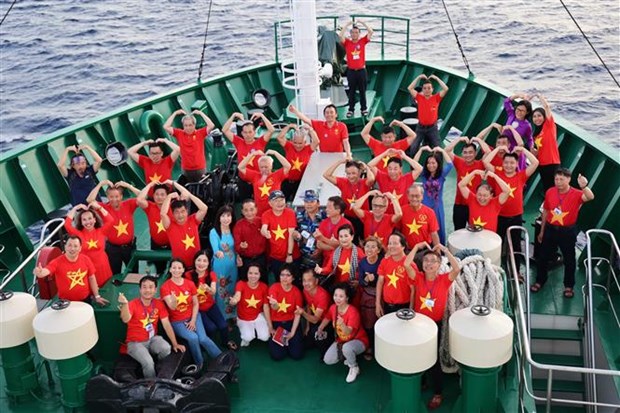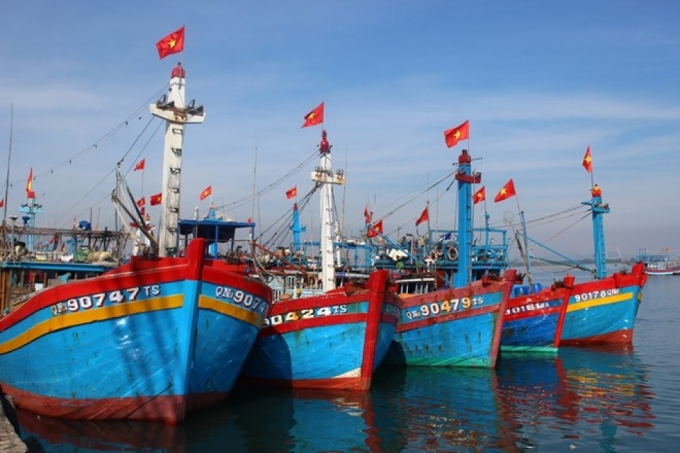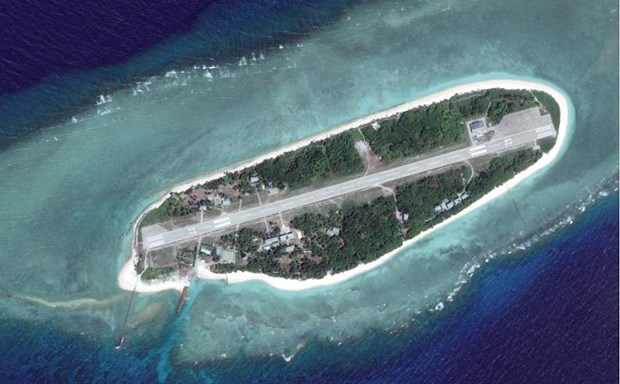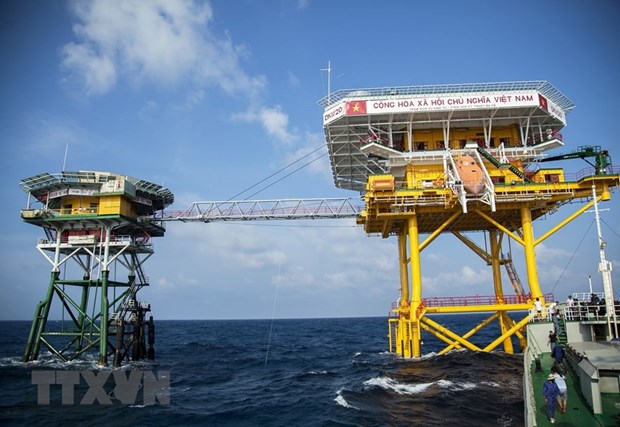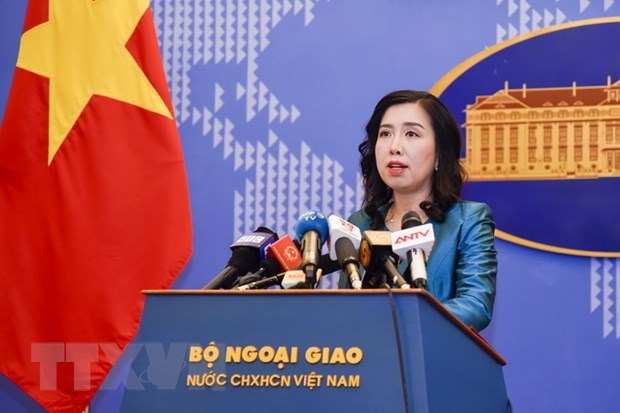On the Vietnamese ship KN 491, in 2018, I had the opportunity to join the 10th working group with more than 70 overseas Vietnamese from 24 countries to experience a memorable journey to Truong Sa archipelago (Spratly islands).
Many of them are writers and artists. With their amazing works, these artists have been sharing to get more people to understand the beloved sea and islands of the Fatherland.
The Maritime Sketches
Early one morning, we saw a strip of land with a small flickering lighthouse in the distance, after nearly two days and nights floating on the cargo ship KN 491, traveling over 350 nautical miles. We were all very excited when about to set foot on Song Tu Tay island, the first destination in the voyage and also the northernmost point of the front archipelago of the country. Focusing on the prow of the ship, everyone wanted to capture the clearest image as a souvenir. On deck, there was only one person attentively sketching.He is Cao Son Tung, a software expert from the National University of Singapore, one of the youngest overseas Vietnamese to join the voyage to the Spratly Islands.
Setting foot on Song Tu Tay, Tung hastily took notes from the flag-raising ceremony all the materials for his artwork later: singing the sacred national anthem on the island, a navy soldier holding a gun under the sovereignty milestone, the roof of a Vietnamese pagoda curved on the edge of the wave, an innocent smile in the class, a monument of the establishment of national sovereignty in 1956 by the government of the Republic of Vietnam...
Returning to Singapore, before completing the unique diary of Vietnam's seas and islands, Tung continuously shared his drawings on the Facebook page named Truong Sa - DK1, October 2018. He did the work with the thought in mind that it was one way to make a small contribution to spreading patriotism in the overseas Vietnamese community.
The Same Root with “Red Blood & Yellow Skin”
Those are the words of the journalist and writer Le Thi Hieu, better known by her pen name of Hieu Constant, a Vietnamese living in France. Before joining the journey, she and other 40 Vietnamese writers from 12 countries around the world returned to Phu Tho province to participate in the incense offering ceremony at the National Historic Site of Hung Temple. During that special trip with the spirit of “returning to the origin”, Hieu Constant was very interested in what poet Huu Thinh - President of the Vietnam Writers' Association said: “From the original land, the people of Vietnam have built this nation over thousands of years. Descendants of the Hung Kings are present all over the world and always carry the blood of Lac Hong. Writers are very proud of the ancestral land, the origin of the culture of the nation.”
 |
| Overseas Vietnamese writers and artists when they set foot on the island. (Photo: Du Hong Quang/TG&VN) |
As a descendent of the ancestral land, I was very happy to see Le Thi Hieu again on the ship KN 491 to the Truong Sa archipelago. She laughed and said: “Buddha has these words ‘It takes hundred of years sitting together in the same boat’; the world is large with several billion people, but we are fortunate enough to sit on the same journey to the remote island”.
Then we shared the legend of 50 children following Mother Au Co up the mountain, 50 children following Father Lac Long Quan down to the sea, expanding the land of our country. She would love to hear about the details in the sixth Hung King's mausoleum, which still contains the king's words: “When I die, bury me on Ca mountain. From above, I will take care of the land for my future generations.” Next to the king's tomb, there is a thicket of giant thorny bamboo, reminiscent of the story of a boy from Giong village who took the king’s order and went to the army to help his country, uprooting the bamboo to defeat the An invaders.
Le Thi Hieu said that after many years of living far away from the country, she always remembers her homeland. “No matter how big the river is, it always flows to the sea. No matter how lush the leaves are, when they are old, they will fall back to their roots. Every tear is salty, every blood is red, Vietnamese people, no matter where they live, no matter their political views, in the end, they still turn to their roots, to their homeland. So why can't we return to unite together and contribute to building a richer and stronger Vietnam?"
Farewell to the sea and islands, she said that after this meaningful trip, she would write a chronicle of Truong Sa, in Vietnamese and French. When I saw the image of the beach morning glory on the white sand of Truong Sa on her personal page, I commented: “Besides the strong octopus bush and putat laut (sea poison tree) stand against the sun and wind on Truong Sa, the beach morning glory is also very strong. Why don’t you write about this, Constant?”. She immediately replied with these words: “Absolutely yes! There will also be a story about sitting on a ship traveling to the fourth land of the Fatherland, amid the vast sea and sky of the country, listening to an officer of the Department of Foreign Affairs of Phu Tho province telling the story of Hung King.” Vietnam has three regions geographically: the North, the central and the South; and Hieu called Hoang Sa - Truong Sa sea and islands the "fourth land" of the country. With that, I appreciate and respect her even more.
Beautiful Poems from Sofia, Bulgaria
Coming to the beloved sea and islands of the Fatherland, the 60-year-old man was still as eager as the younger artists. Strong, agile, resourceful, taking photos here, taking notes there, Nguyen Huu Thao, an overseas Vietnamese in Bulgaria, showed his strength and quickness. During the journey, you will see him taking photos or jotting down his notes every minute, which makes even professional journalists admire him.
Thao said he was still 19 years younger than an overseas Vietnamese sharing the same room with him on the ship. That is Mr. Bui Cong Tuyen, born in Laos, with a leg deformity due to a fall when he was young. After nearly 80 years of living in Laos, he did not think there would be a day when he would be able to go to the sea and islands of his country. Thao said that compared to Mr. Tuyen, he is much younger and stronger, so he has to work harder. Thao tried to capture the most authentic images so that when he returns to Sofia, he can share them with other overseas Vietnamese and international friends in his community to better understand this sacred sea and islands of Vietnam.
It is worth mentioning that Thao wrote many passionate poems. Doing business in Europe, he and other overseas Vietnamese had to go through many hardships to have a good life today. At such times, he wrote poems about his homeland, considered them a source of strength to encourage him to overcome his difficulties.
Impressed with the poems about Truong Sa that Thao presented on the ship KN 491, I attentively read the poems he shared online when he returned to Bulgaria. While in Sofia, receiving a phone call from a navy soldier from Phan Vinh island (in the Spratly archipelago), Thao wrote: “Dear far away island soldier/ You make me emotional/ In the middle of a peaceful Europe / Remember Truong Sa with rolling waves”.
If poetry is the voice of one's heart, then Thao is helping us to feel and reflect on all the emotions of a very meaningful trip in life. Indeed, that is a trip to be grateful to the soldiers guarding the stormy front lines, a trip for us to appreciate more what we are having now, and a trip to learn that we are not too small and insignificant./.
Q.Hoa t.h / Thoidai


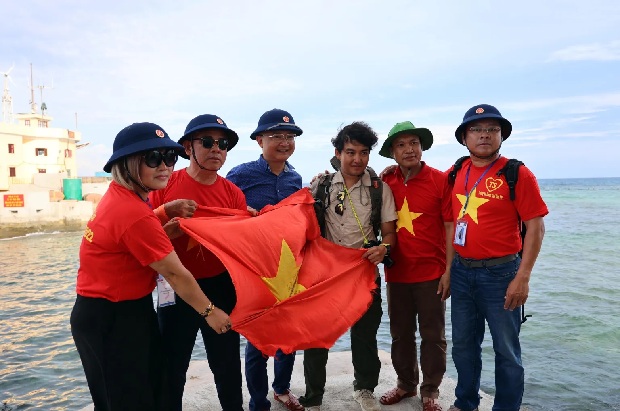
.jpg)

